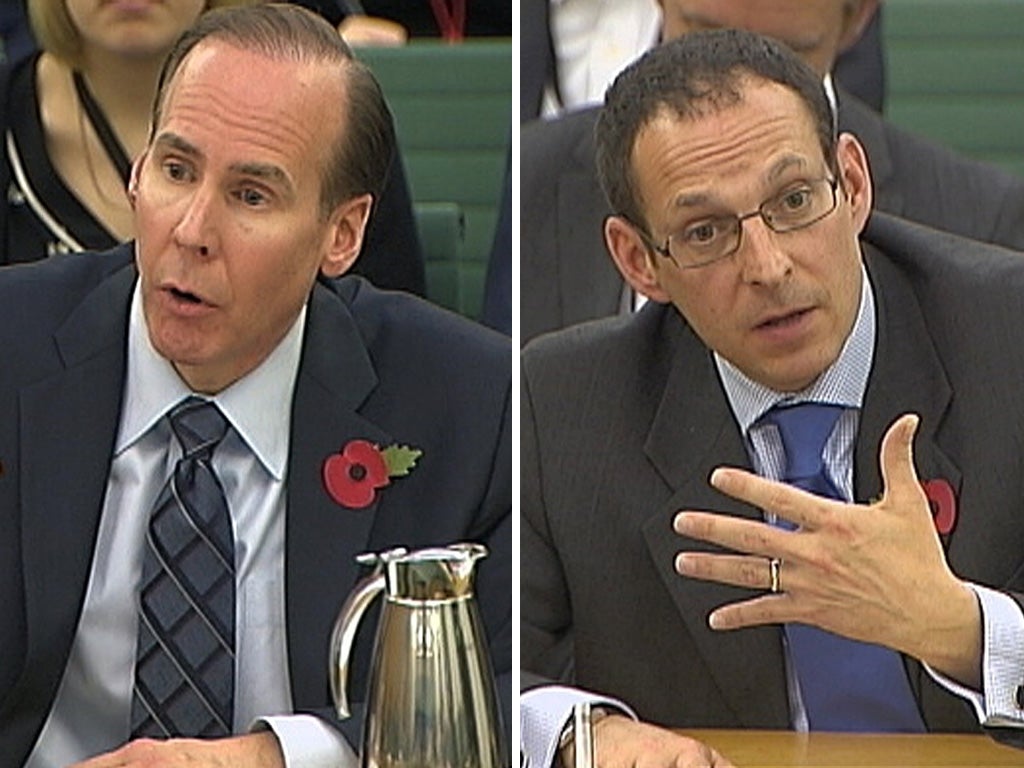Amazon under fire over accusations it 'manipulates' profits to avoid paying tax
Starbucks and Google admit to MPs they use favourable jurisdictions for their UK businesses

Your support helps us to tell the story
From reproductive rights to climate change to Big Tech, The Independent is on the ground when the story is developing. Whether it's investigating the financials of Elon Musk's pro-Trump PAC or producing our latest documentary, 'The A Word', which shines a light on the American women fighting for reproductive rights, we know how important it is to parse out the facts from the messaging.
At such a critical moment in US history, we need reporters on the ground. Your donation allows us to keep sending journalists to speak to both sides of the story.
The Independent is trusted by Americans across the entire political spectrum. And unlike many other quality news outlets, we choose not to lock Americans out of our reporting and analysis with paywalls. We believe quality journalism should be available to everyone, paid for by those who can afford it.
Your support makes all the difference.Amazon was mauled by MPs for failing to answer questions about its tax affairs amid suspicions that it "manipulates" its accounting to avoid paying a lot of tax in Britain.
In a bad-tempered session of the Commons Public Accounts Committee, the internet giant's director of public policy, Andrew Cecil, was humiliated by MPs furious at his apparent ignorance of his company's affairs.
Mr Cecil, one of the representatives of three American companies grilled by the committee yesterday, was repeatedly unable to divulge the most basic answers about Amazon's tax arrangements.
Amazon's profits are booked in low-tax countries and losses are filed in high-tax jurisdictions – such as Britain. Amazon Sarl, based in Luxembourg, for instance, gathers most of Amazon's UK revenue even though it employs only several hundred people compared with 15,000 in the UK itself.
The committee's chairman, Margaret Hodge, with a face like thunder, told him: "Frankly, we think you manipulate your profits… you're not serious here. They have set you up. It's outrageous. We have a very busy committee but we'll ensure we get the answers and we will order a serious person to appear."
In another unsatisfactory encounter – as far as the cross-party committee was concerned – Starbucks' chief financial officer, Troy Alstead, maintained that it did not deliberately cook its books to avoid paying corporation tax in the UK.
The US coffee chain has filed losses in the UK for most of the years it has been operating here, despite reportedly telling US investors that the business was healthy. The British subsidiary of the coffee company pays a 4.7 per cent royalty on sales to a Starbucks firm in Amsterdam where it has a "sweetheart" tax deal with the Dutch authorities. The UK end of the business also buys the coffee beans from Starbucks in low-tax Switzerland.
Ms Hodge told Mr Alstead: "You have run the business for 15 years and are losing money and you are carrying on investing here. It just doesn't ring true. You are losing money.
"You have tried for 15 years and failed and you have promoted the guy who failed. It doesn't ring true, Mr Alstead, that's what frustrates taxpayers in the UK."
She added: "Are you lying to your shareholders?"
Mr Alstead replied: "Absolutely not. We are not at all pleased about our financial performance here. It is fundamentally true everything we are saying and everything we have said historically. We are not aggressively looking to avoid tax." He conceded that the Dutch tax deal was "an attractive reason" for being based there but denied it was the sole one – and said the entire world's coffee trade was centred around Switzerland.
The committee also questioned Matt Brittin, chief executive officer of Google UK.
Google has located its European headquarters in low-tax Ireland. Mr Brittin struggled to answer many of the technical questions, saying he was not a tax accountant, but insisted Google operated in line with tax laws everywhere it operated in the world.
Mr Brittin said: "We are paying the tax we are required to under the law, and we are not avoiding tax."
Two committee members barked back at him: "You are avoiding tax."
Ms Hodge said that some of the profits from the UK operations ended up in the Cayman Islands. "The way we're set up reflect how our operations occur," Mr Brittin said. "We think we do in a way that's appropriate. We certainly pay all the tax we're due to."
"Am I right in thinking your tag-line is: 'Do no evil?'" asked one committee mem-
ber. Mr Brittin replied: "That is a phrase used to crystallise the values of how we at Google try to operate."
Challenged whether he was living up to that motto, he said: "We try to operate to a high standard, but we might not always get it right."
Richard Murphy, a chartered accountant and director of the campaigning group Tax Research, said: "If you want to know why Parliament is worthwhile this hearing on corporate tax this afternoon is why."
What they pay and what they said
"Respectfully I can assure you there is no tax avoidance here": Troy Alstead, global chief financial officer, Starbucks
UK sales last year: £398m. Tax paid: £0
"The strategic functions for our business are in Luxembourg”: Andrew Cecil, director of public policy, Amazon
UK sales last year: £3.3-4.5bn. Maximum amount of tax paid last year: #163;1m
Join our commenting forum
Join thought-provoking conversations, follow other Independent readers and see their replies
0Comments